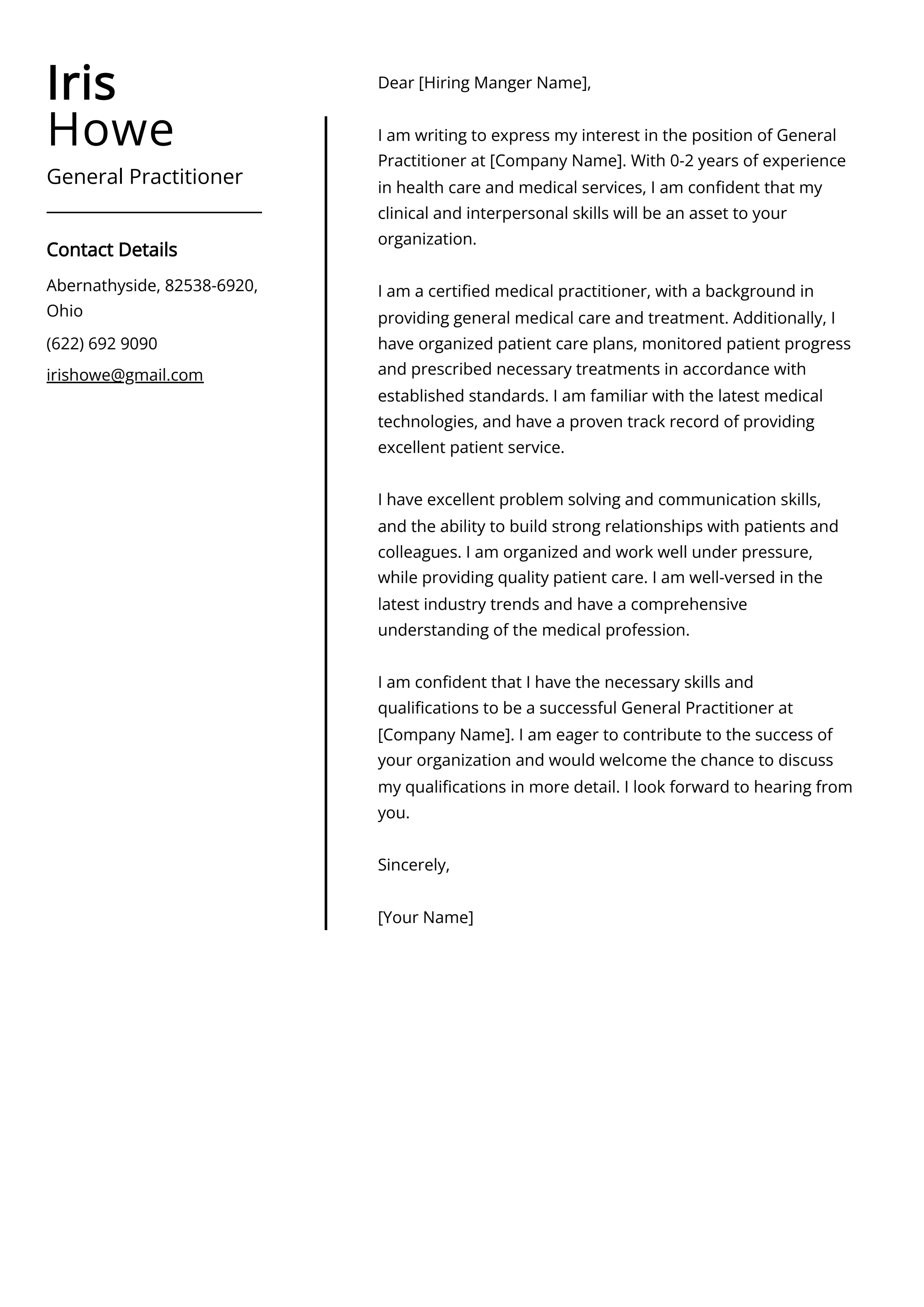Crafting a Compelling Cover Letter
A well-written cover letter is your first opportunity to make a positive impression on a potential employer. Even without direct experience as a healthcare assistant, a compelling cover letter can showcase your suitability for the role. It’s more than just a formality; it’s a chance to highlight the skills, qualities, and experiences you possess that align with the job requirements. This guide will walk you through the essential components of a cover letter, offering practical advice and examples to help you stand out from other applicants, even if you’re a beginner. Remember, your cover letter is your voice, let it speak volumes about your potential and dedication to the healthcare field. Focusing on your strengths and showing a genuine interest in helping others will significantly increase your chances of securing an interview.
Highlighting Transferable Skills
When you lack direct experience, emphasizing transferable skills is crucial. These are abilities and qualities you’ve developed in other contexts, such as volunteer work, previous jobs, education, or even personal experiences. Think about the skills that are valuable in a healthcare setting, such as communication, empathy, teamwork, and problem-solving. Identify situations where you’ve demonstrated these skills. For example, if you’ve volunteered at a community center, you can highlight how you assisted individuals, showed compassion, and worked collaboratively with others. The key is to illustrate how your past experiences have equipped you with skills that can be successfully applied in a healthcare environment. This approach effectively bridges the experience gap and demonstrates your readiness to take on the challenges of the role.
Skills to Showcase
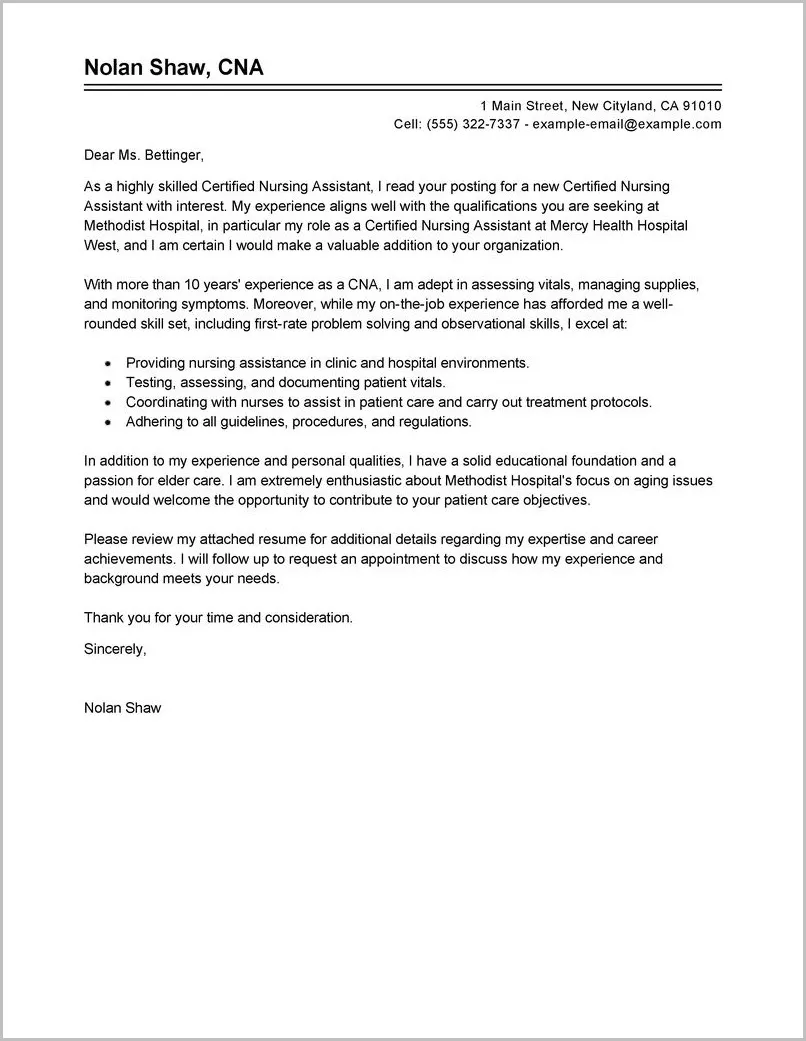
The healthcare industry demands a unique blend of skills. While you may lack specific experience, certain skills are universally valued. Demonstrating these abilities in your cover letter can make a significant impact. By carefully highlighting and providing examples of these skills, you increase your chances of getting noticed. Focus on skills that are essential for success in the healthcare field and show how you have used them to achieve positive outcomes in the past. Showing the skills on the list can make all the difference in getting the job.
Communication Skills
Effective communication is paramount in healthcare. Healthcare assistants must be able to communicate clearly and respectfully with patients, their families, and other healthcare professionals. This involves active listening, the ability to explain information in a simple and understandable manner, and the capacity to convey empathy and reassurance. In your cover letter, provide examples of situations where you successfully communicated with others, perhaps in a customer service role, volunteer position, or educational setting. Describe how you adapted your communication style to different audiences and how you ensured your message was understood. This will showcase your ability to build rapport and maintain positive relationships, which are crucial in a healthcare setting.
Clear and empathetic communication is vital for building trust with patients. It helps in providing comfort, understanding patient needs, and relaying crucial information to healthcare teams. In your cover letter, demonstrate your ability to listen actively, provide clear explanations, and show sensitivity towards others. If you have experience in roles where you had to explain complex information simply, or comfort someone in distress, make sure to mention them. Remember, a healthcare assistant frequently communicates with vulnerable individuals, so emphasizing your communication skills will greatly increase your appeal to potential employers.
Empathy and Compassion
Healthcare assistants must possess a deep sense of empathy and compassion. Patients often require emotional support and understanding during their treatment. Your cover letter should convey your ability to connect with others on an emotional level and demonstrate your genuine concern for their well-being. Share instances where you’ve shown empathy, such as when you supported a friend or family member through a difficult time or volunteered at a charitable organization. Describe how you listened attentively, offered comfort, and showed compassion in a meaningful way. Highlighting your empathetic nature will show the hiring manager that you genuinely care about people, a crucial trait in a healthcare assistant.
Healthcare environments frequently involve stressful situations. Empathy and compassion enable you to support patients with their physical and emotional needs. Your ability to remain calm, provide reassurance, and offer comfort is crucial. If you have any experience dealing with emotionally challenging situations, such as helping a family member through a difficult period or volunteering with vulnerable populations, be sure to mention it in your letter. Show that you understand the importance of providing comfort and a supportive presence, which significantly enhances a patient’s experience and recovery.
Teamwork and Collaboration
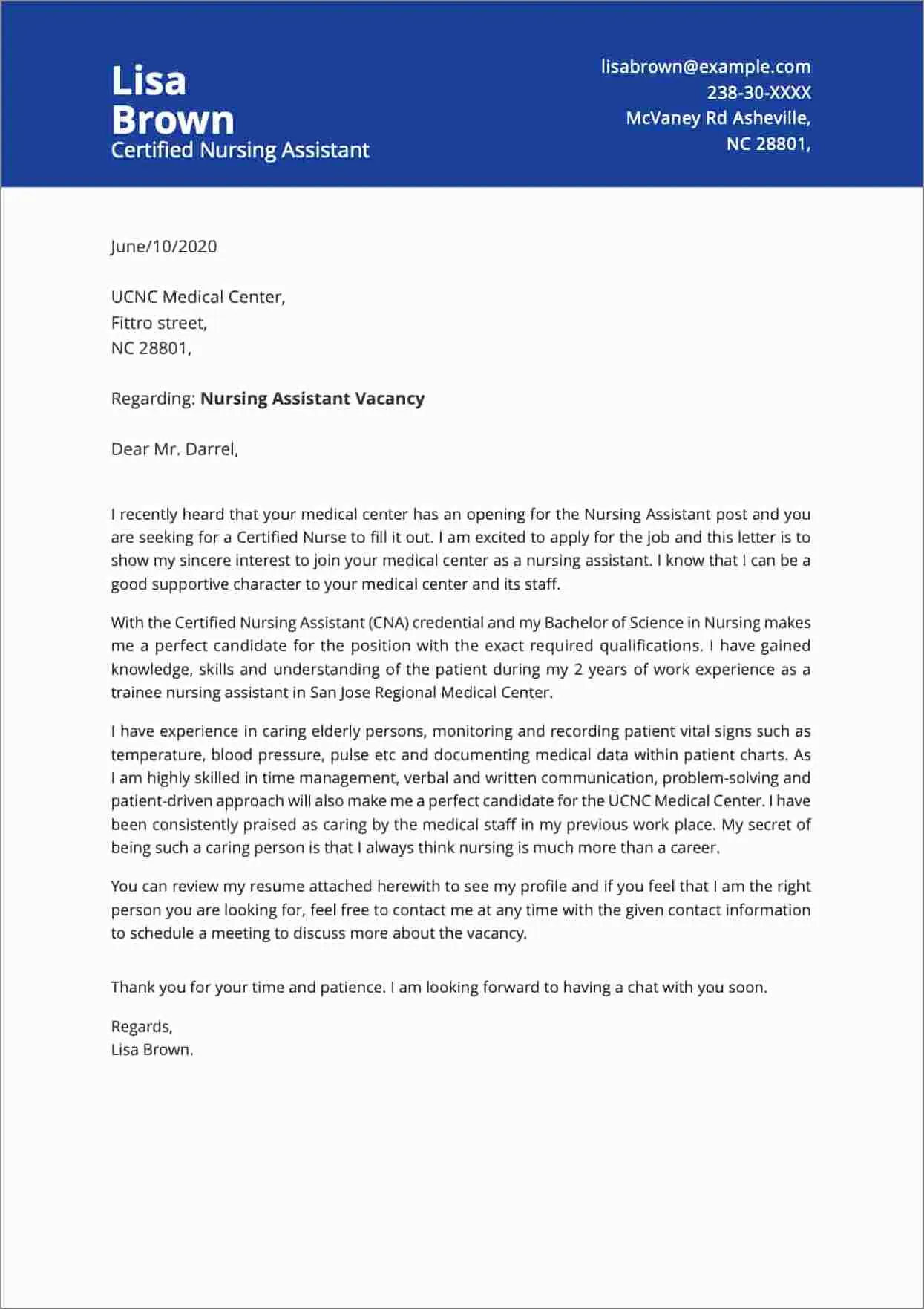
Healthcare is a team effort. Healthcare assistants work closely with nurses, doctors, and other healthcare professionals. Your cover letter should highlight your ability to work collaboratively as part of a team. Describe your experience working in group settings, whether it’s in a school project, a sports team, or a previous job. Give specific examples of how you contributed to the team’s success, such as by sharing your ideas, supporting your colleagues, or taking on responsibilities. Demonstrating your teamwork skills will assure the employer that you can effectively work with others, contributing to a positive and efficient work environment.
The ability to cooperate and collaborate with various professionals is fundamental to providing efficient and effective patient care. In your cover letter, illustrate your experiences in group settings. Highlight the times you have successfully coordinated with others, shared responsibilities, and worked towards common objectives. Illustrate your willingness to support colleagues, communicate openly, and adapt to changing circumstances, showing your adaptability and contribution to a cohesive healthcare team.
Addressing the Lack of Experience
Acknowledge the lack of direct experience upfront in your cover letter. Instead of dwelling on the negatives, immediately pivot to emphasize your strengths and potential. You can state something like, “While I do not have direct experience as a healthcare assistant, I am eager to leverage my transferable skills and dedicated work ethic to excel in this role.” Then, focus on the skills and qualities you possess, such as your strong communication skills, empathy, and willingness to learn. Show that you are aware of the requirements of the job and that you are prepared to quickly acquire the necessary skills and knowledge through training and dedication. This will show the employer that you are prepared to adapt and contribute meaningfully.
Focusing on Enthusiasm and Willingness to Learn
Expressing genuine enthusiasm and a strong willingness to learn is paramount if you have no prior experience. Your cover letter is the perfect place to convey your passion for healthcare and your dedication to patient care. State that you are excited about the opportunity to learn and develop new skills within the healthcare assistant role. Highlight any relevant training or certifications you are pursuing or plan to pursue. Emphasize your eagerness to take on new challenges, and showcase your ability to quickly adapt to new environments. Your willingness to learn demonstrates your potential to be a valuable asset to the team, even if you lack direct experience.
Researching the Healthcare Facility
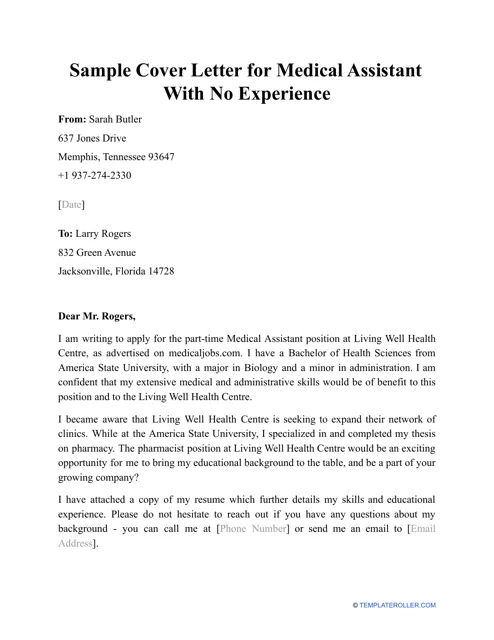
Before writing your cover letter, research the healthcare facility or organization you are applying to. Understand their mission, values, and the services they provide. Tailor your cover letter to align with their specific needs. Mention why you are drawn to that particular facility and explain how your skills and qualities match their requirements. If the facility emphasizes patient-centered care, highlight your empathetic skills and commitment to patient well-being. Showing that you’ve taken the time to research the facility will demonstrate your genuine interest in the role and your ability to adapt your skills to their specific needs. This personalized approach will help you stand out from generic applications.
Tailoring Your Letter to the Specific Job
Carefully read the job description and tailor your cover letter to match the specific requirements and expectations of the role. Identify the key skills and qualities they are looking for and make sure to address them directly in your letter. Use the same keywords and phrases from the job description to emphasize your relevance. Avoid sending a generic cover letter to multiple positions; each application should be customized to reflect the requirements of the specific job you are applying for. This attention to detail will show the hiring manager that you have a genuine interest in the position and that you understand the needs of the role.
Formatting and Structure
A well-formatted cover letter is easy to read and makes a positive impression. Use a professional font, such as Times New Roman, Arial, or Calibri, and keep the font size between 10 and 12 points. The letter should be no more than one page in length. Break up your text into clear paragraphs with a logical flow. Use headings and bullet points to make your information easy to digest. Ensure proper grammar and spelling, as any errors can detract from your credibility. A clean and professional format demonstrates your attention to detail and respect for the employer.
Writing a Strong Opening
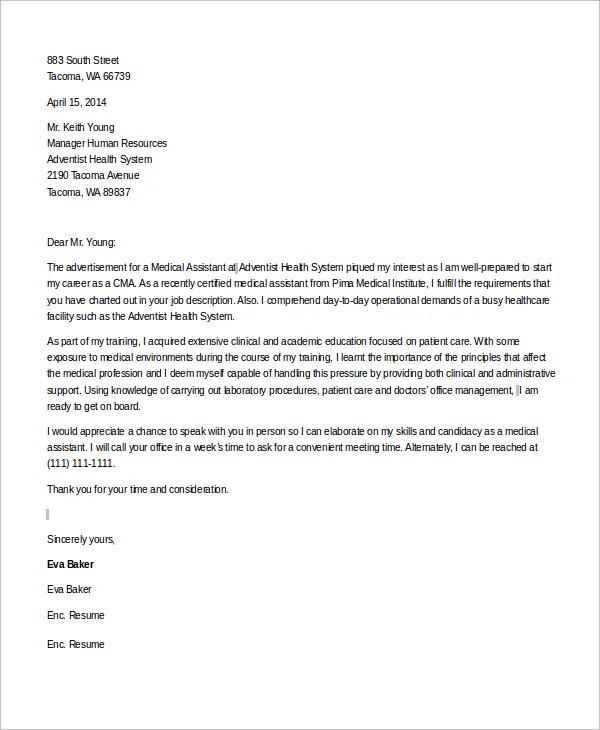
Your opening paragraph is critical as it sets the tone for the rest of the letter. Start by stating the position you are applying for and how you learned about the opportunity. Then, immediately capture the reader’s attention by briefly summarizing your key skills and qualifications. If you have a connection or referral, mention it in the opening. Express your enthusiasm for the position and highlight your understanding of the role and the healthcare facility’s mission. A strong opening should quickly convey your interest, and show why you are a suitable candidate. This initial statement is vital for immediately capturing the employer’s attention and setting a positive tone.
Body Paragraphs for Impact
The body paragraphs should elaborate on your skills and experiences, providing specific examples to support your claims. Each paragraph should focus on a key skill or quality that is relevant to the job requirements. Use the STAR method (Situation, Task, Action, Result) to describe your past experiences, this is a clear and concise way to showcase your abilities and demonstrate the value you can bring to the role. Provide tangible examples of how you have demonstrated the necessary skills. If you state you are a good communicator, follow it by an example of your communication skills in a customer service role, or in a volunteer role.
Closing with Confidence
Your closing paragraph should confidently summarize your interest in the position and your eagerness to be considered. Reiterate your enthusiasm for the opportunity and your belief that your skills align with the role. Thank the hiring manager for their time and consideration. Include a call to action by stating that you are available for an interview and providing your contact information. Proofread your entire cover letter to ensure that it is error-free before you submit it. A strong closing leaves a lasting positive impression and increases the chances of receiving a call back.
